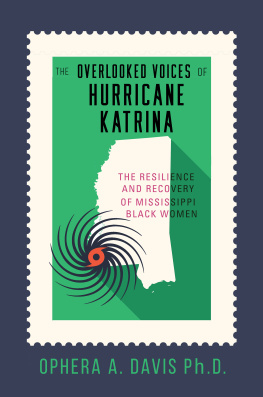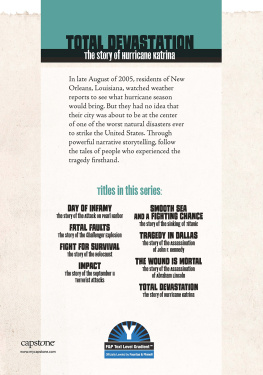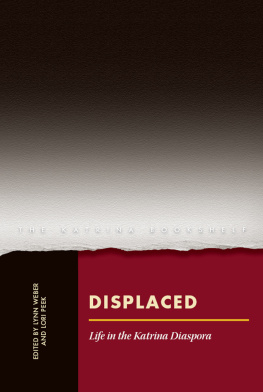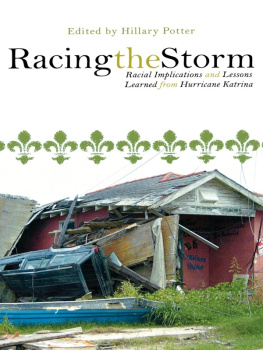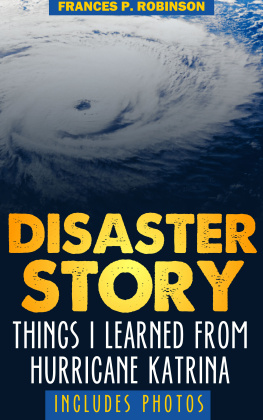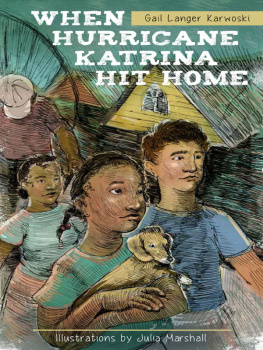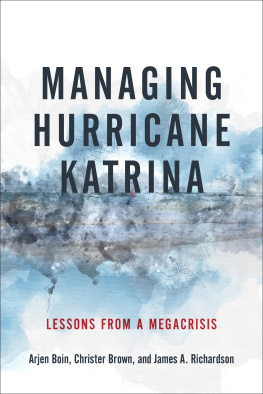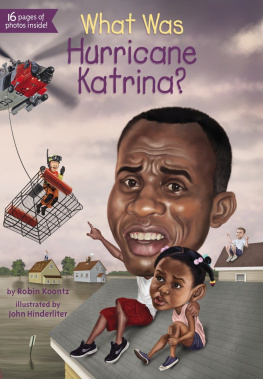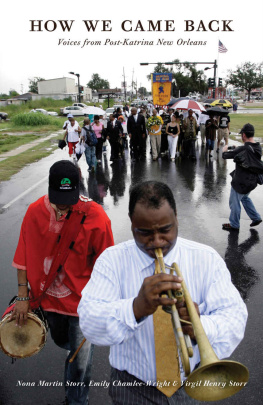The Overlooked Voices of Hurricane Katrina:
The Resilience and Recovery of Mississippi Black Women
By Ophera A. Davis Ph.D.
Copyright 2021 Ophera A. Davis
ISBN 978-1-64663-427-9
All rights reserved. No part of this publication may be reproduced, stored in a retrieval system, or transmitted in any form or by any meanselectronic, mechanical, photocopy, recording, or any otherexcept for brief quotations in printed reviews, without the prior written permission of the author.
REVIEW COPY: This is an advanced printing subject to corrections and revisions.
Published by

3705 Shore Drive
Virginia Beach, VA 23455
8004354811
www.koehlerbooks.com
THE OVERLOOKED VOICES OF HURRICANE KATRINA
THE RESILIENCE AND RECOVERY OF MISSISSIPPI BLACK WOMEN
OPHERA A. DAVIS PH.D.

DEDICATION
T HIS BOOK IS DEDICATED to my elders. I stand on your shoulders.
To the women in my family: I remember when Mother took me to see my fourth-generation maternal grandmother, Susie, who I saw on several occasions in Mississippi although you were bedriddenwhat a profound memory I have of you, including your home-going service. Dearest paternal great-grandmother, Catherine, who was also born into slavery. You went to glory before I could see you in person, but the photos of you are amazing, and I thank you for the womanist spirit you passed down the family line that I have heard about from family members over the years.
To the women who experienced Hurricane Katrina, whether grandmothers, mothers, aunts, sisters, nieces, granddaughters, non-binary, or straight whose voices have never been heard, this book is for you. To the women who perished after the storm, let this book make people think of you and the remarkable stories you would have shared. To the women whose stories are still unknown and sidelined, may this work serve as an impetus for researchers to initiate new projects that add their stories to the disaster canon. To the incredible women who gave me the privilege of interviewing you over the years since Hurricane Katrina, I hope this volume is a clear indicator that your experiences and voices will never be silenced again. Thank you for allowing me to tell your stories.
FOREWORD:
Storm surge, high rivers and rain... When I wrote this, Tropical Storm Barry was gathering momentum on the Gulf Coast of the United States, threatening to become a hurricane, and again placing the people of Louisiana and Mississippi on edge. Whether or not the storm becomes a hurricane, it has already brought flood waters into neighborhoods, homes, and businesses in the Gulf region, and images abound of people wading their way through flooded streets, babies and belongings in hand, seeking safety, fearing danger and destruction. These scenes inspire anxiety not only in me, 1500 miles away, but more specifically in those who remember Katrina.
Hurricane Katrina was a disaster like no other in United States history. Not only was it tremendous in its meteorological scale and scope, but it was also terrible in its sociological scale and scope. It has become one of Americas most iconic disasters. Due in part to the role of the media, it was the first natural disaster on U.S. soil to expose beyond any doubt how natural disasters exacerbate and amplify existing racial, class, and gender inequalities. No one could deny or explain away the black and brown faces of people who were left behind to suffer and struggle in the aftermath, or the black and brown bodies that were found during the prolonged recovery efforts. Katrina showed America a new and unforgettable face of its own ugly racism.
Yet there was also a womens story to this disaster specifically, a Black womens story. While most accounts of women and the storm focused on womens vulnerabilities the fact that women there, as everywhere, were more likely than men to be poor, elderly, caring for others, or subject to violence a few accounts focused on womens resilience under these conditions of extreme deprivation and womens creative and heroic caring for others similarly situated. In the face of being left to die, many Black women individually or collectively rose up to prove defiantly no, not us, not this time.
The Katrina episode was just one more instance in which Black women could prove what they have already proven so many times across the history of their time in the Americas: We specialize in the wholly impossible. could serve as a motto for Black womens indomitable survival genius in the face of every possible kind of threat, from slavery to racism to sexism to economic insecurity to... natural (and unnatural) disasters .
Another oft-repeated phrase that sums up Black womens genius is making a way out of no way. This popular African America expression, repeatedly invoked by scholars and nonscholars alike,
This womanist genius is often most visible during catastrophe. When everything is shaken up and nothing is as yet settled down, those with genius and self-possession step forward to lead and help. Catastrophes showcase the skillsets that are otherwise quietly holding whole worlds together for so many which is the typical positionality for Black women: behind the scenes, nurturing life, keeping things from falling apart, healing hearts, bodies, and souls, providing material, emotional, intellectual, and spiritual resources for children, for spouses, for parents and grandparents and in-laws and siblings and cousins, for workplaces, for neighborhoods, and, yes, again, for nations and the world. This unsung daily grind produces salvational genius the ability to step up during catastrophes and make sure that people survive and, ultimately, thrive again.
This work is not, however, without its costs physical, emotional, spiritual, material, relational. These Africana womanist geniuses are life-givers, yet life doesnt always restore them us equally. An imbalance between giving and receiving creates a kind of suffering that must be dealt with, one way or another. For some, it creates the crucible that yields a kind of transcendence. For others, it results in the gradual or rapid loss of vitality, which can manifest as unwellness and even result in that ultimate transition euphemistically characterized as going from labor to reward. For many, the experience falls somewhere in the middle or at the intersections of all of these outcomes.
Hurricane Katrina was a disasters disaster environmental, social, financial, political, spiritual in which Africana women were at the epicenter, as victims, helpers, survivors, and rebuilders. In Ophera Daviss Overlooked Voices of Hurricane Katrina , we hear twelve women whose lives were turned upside down by that disaster narrate their experiences of catastrophe, survival, suffering, recovering, resilience, and genius. Its all there. Through her prowess as an interviewer, social psychologist, and womanist theorist, Davis presents us with a sensitive and illuminating account containing nuances of observation that arise from her shared experience as a Gulf Coast native and her identity as an African American female cultural insider. This book is important to the literature on women and disaster for precisely these reasons but it is also a gift to the fields of American studies, especially Gulf Coast studies, Africana Studies, womanist studies, and black womens studies more generally. It is also a useful contribution to psychology, social work, and other helping professions, particularly those that embrace trauma-informed perspectives and recognize the resiliency of those marginalized by mainstream society. Daviss book will also be a good and therapeutic read for those of any race, gender, or class who lived through the terrible episode now known by its single name: Katrina.

